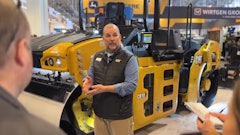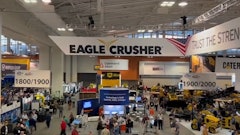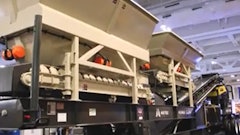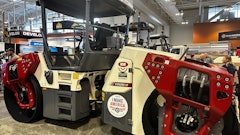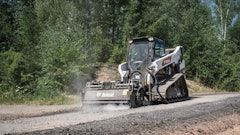
Bigger, stronger, faster. In a world where time is of the essence and money is tight, efficiency is crucial. It’s no surprise business leaders like Dan Linley continually search for methods and products to make their operations soar. Linley, vice president of Superior Asphalt in Jackson, MS, found the boost he was looking for in processing an old product with a new machine.
Superior Asphalt Inc., founded in 1991, began as a small, one-plant asphalt operation that mainly paved parking lots. Now, 22-years later, the company operates out of four asphalt plants and is the second largest highway contractor in Mississippi. Pulling from its five sand and gravel pits throughout the state, as well as milling and crushing reclaimed asphalt pavement (RAP), Superior now produces approximately 1 million tons of asphalt per year. About 90 percent of that is used for re-paving state highways and 10 percent is allotted to government and private projects.
Chalk it up to a hot market. According to the National Asphalt Pavement Association (NAPA), asphalt is the country’s number one recycled material – including typical household items such as glass, plastic and tin. The growth rate is immense for the material, with 56 million tons of RAP used in 2009 and 62.1 million tons in 2010, an increase of 6.1 million tons in just one year.
The sudden growth spurt and high demand for the material can be largely attributed to changes in state DOT regulations. In many states, the policies have gradually shifted after re-evaluation of the cost savings and durability of asphalt mixes containing RAP versus solely virgin materials. In recent years, state DOTs have increased the amount of RAP they allow in new roads.
“The numbers are continually increasing,” Linley says. “We needed more and more, considering the percentage of recycled material we are allowed to put into asphalt has gone from 12 percent all the way up to 30 percent.”
Dollars & cents
Noting that liquid asphalt cement, which makes up 5-6 percent of an asphalt mix, sells at rates ranging from $450 - $650 per ton, Linley says it’s the most expensive material in an asphalt mix. However, the residual liquid asphalt within RAP material – usually 3-5 percent – makes the entire process more economical, even after factoring in the cost of milling, hauling and crushing.
To demonstrate the cost savings, turn your eye toward the 62.1 million tons used in 2010. A level of 5 percent liquid asphalt in RAP represents more than 3 million tons of asphalt binder conserved. Further, a high RAP mix lasts longer compared to a 100 percent virgin mix, according to the National Center for Asphalt Technology.
This math goes hand in hand with nationwide highway departments and road builders looking for the most bang for their buck during tight economic times. Using RAP in the mix allows provides the means to produce a longer stretch of road with higher durability at a reduced cost – a few key factors that make RAP the cool kid on the block.
Because of the rapid growth and popularity of RAP in recent years, companies like Superior Asphalt are thriving. Business owners commonly take times like this to evaluate their operations in search of areas of improvement or ways to streamline everyday processes to ensure peak performance and allow for future growth.
Until mid-2011, four hired contractors were crushing the RAP and concrete that Superior Asphalt milled off Mississippi highways. While hiring out this portion of the business was working, Superior wanted to have better control of the end product, and considered purchasing a machine of its own to cut costs and possibly boost efficiency.
Well versed in the industry and familiar with impact crushers used by hired contractors, Linley began researching similar crushing and screening plants. He knew he needed a machine with accurate sizing, portability and the ability to obtain high output. He discovered the Rapid Deployment System (RDS-15) horizontal mobile crushing plant by IROCK Crushers. Several of the machine’s features that are specific to the asphalt industry caught Linley’s attention.
Increasing production
“IROCK’s closed-circuit design offers the option to recirculate material that needs further sizing,” Linley explained. “The design is meant to boost productivity by up to 20 percent, and can achieve rates of up to 350 tons per hour (TPH). Considering this feature alone, it was easy to see the machine would allow greater production in less time. And, with less time spent producing the tonnage of RAP needed, we would being looking at lowering our labor costs and reducing operational expenses.”
After seeing the machine in operation, Linley quickly confirmed it would boost production rates for Superior. Recyclable asphalt is commonly trucked to Superior’s sites in sizes ranging from 1 ½ to 18-inch chunks, and the company spends a lot of time crushing the material down to the ¾-inch size needed for the asphalt mix. Linley found that material could transfer through the machine more efficiently when he set the crusher slightly wider and placed larger screens – 1¼-inch and 1-inch – on the top two decks, rather than the ¾-inch needed.
With this configuration, 10-15 percent of the material requires further sizing, which would become a time-consuming dilemma in many cases. However, IROCK’s exclusive two-deck automatic return conveyor, oversize material is brought back to the crusher for re-sizing.
According to Linley, Superior’s boost in production was even greater than the estimated 20 percent. The RDS-15 has taken the company from processing rates around 175 tph with the hired contractors to 250 tph with IROCK’s closed circuit unit, which is an increase of more than 40 percent. Superior now can process 240,000 tons of RAP per year – 60,000 at each plant.
Significant cut in costs
Accompanying the drastic increase in production was a significant cut in costs. Based on a 10-hour day, labor costs for three guys, the price of a loader and bulldozer, and operational costs such as fuel, Linley estimated the cost per ton averages about $3. After just a year of owning the RDS-15, Linley has calculated approximately 30 percent cost savings compared to its previous business model. This adds up to to about $1 per ton, or nearly $250,000 in just one year.
“We’re saving a significant chunk of cash by operating our own machine rather than hiring the work done,” Linley says.
Because the unit operates out of four asphalt plants, portability has become important to Superior, as well. The RDS-15 spends three weeks at each plant, twice per year. In other words, the unit is exposed to a lot of windshield time. From Gulfport (160 miles south of Jackson), to Batesville, (150 miles north of Jackson), to Forest (40 miles east of Jackson), the typical route to each plant comes in at around 350 miles. Added to that are the miles the unit travels to Superior’s sand and gravel pits and to other jobsites to perform concrete crushing.
The ease of transport of the unit has been a huge factor to Superior, as the machine can easily be hooked up to a truck and be hauled as one unit. Not only is it a time-efficient design with quick set-up time, but it’s also economical, as no additional equipment is required to disassemble the plant before travel.
“With multiple plants around the state, we needed a portable unit. We also have weight laws to obey and wanted a unit that made relocating easy. The RDS-15 doesn’t require removing parts prior to moving,” Linley explains.
Once the unit is set up at one of Superior’s asphalt plants, operators use the machine to process enough material to fulfill more immediate needs – usually around 30,000 tons. From there, the company schedules plant visits on an as-needed basis to prevent pre-crushed, stored material from melting together on hot days.
Linley and the Superior crew have been very pleased with the performance of the RDS-15 since the purchase just a year ago. It’s easy to see how this company’s commitment to bigger, stronger and faster has led to a highway paved with greater efficiency, more production, and serious return on investment.










